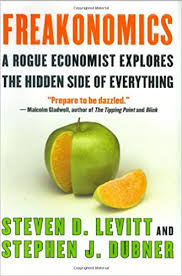|
Freakonomics: A Rogue Economist Explores the Hidden Side of Everything
by Steven D. Levitt and Stephen J. Dubner Published in May 2005 (Updated in 2010) 336 Pages Thibault’s Score: 4/5 I was first recommended the book Freakonomics when I was in the 8th grade of high school, only a few years after its initial publication, but didn’t read the book. Later, in high school I had an absolutely amazing economics teacher by the name of Mr. Blackburn who screened segments from the 2010 Freakonomics movie. The book was very interesting, and covers a wide range of topics from the perspective of economics. The chapters are diverse, and have no common theme besides their use of data and their compelling character. One chapter compares cheating teachers, sumo wrestlers, and self-service bagel stands. It exposes how people cheat, why people cheat, and highlights statistical methods to find cheaters. Chicago teachers had a financial incentive for their students to score higher on standardized tests. As a result, many began tweaking the answers that their students gave on multiple choice tests. Freakonomics explains how the authors, by looking at test results, caught cheating teachers, and changed the incentives. Another chapter explains how present crime rates are affected by abortion rates one generation earlier. When abortion was legalized, crime rates dropped because many low income children of single mothers were simply never born. Chapters such as the one explaining why drug dealers are so poor, or why black parents choose dumb names for their kids (IE Emraldina, DeShawn, or Shanice), or how the KKK was defeated in the 1940s are all amazing. They reveal deep truths about the human condition backed up by economics and rational analysis. One criticism that I have is that one chapter uses scant statistical evidence to show that good parenting has little impact on the life outcomes of children. Since this book was written nearly a decade ago, a large quantity of statistical evidence has emerged contradicting these findings. For example, many studies of corporeal punishment and spanking have found causal effects between punishment and negative life outcomes. Overall, this is an excellent book, and a recommended read for anyone interested in sociology or economics. As the evidence mounts, however, more and more chapters will become out of date. Something that I can’t quite place my finger on about this book felt very “early 2000s” - if you are to read this book, I recommend doing so sooner than later. Also for some reason, this book is banned in Texan prisons.
0 Comments
Leave a Reply. |
Thibault SerletMost of my articles are book reviews, but I also write about many other topics. Archives
December 2023
Categories |

 RSS Feed
RSS Feed